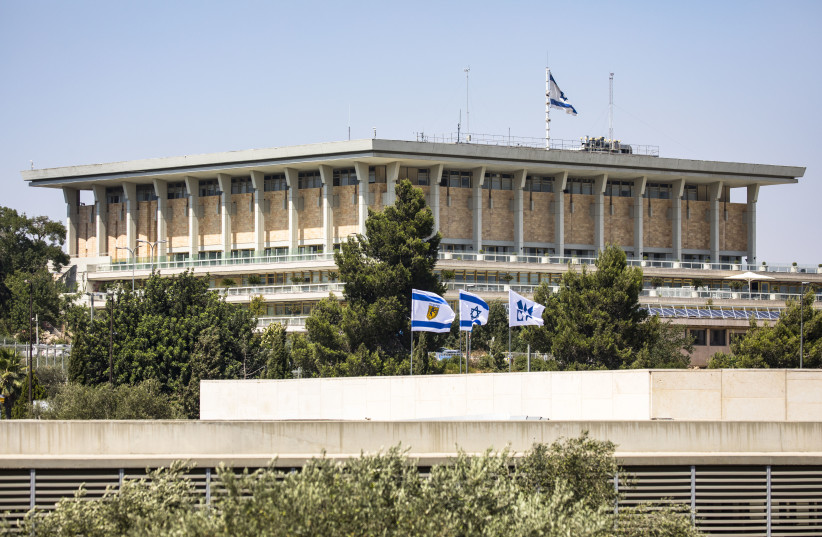When historians look back someday on the 2024 Hamas war, January 22 – the 108th day of the war – will merit a brief mention.
Why? Nothing overly dramatic happened on the battlefront, neither in Gaza – although there was intensive action in Khan Yunis – nor in Lebanon. Rather, this day will be worthy of note because it was the first time since October 7 that one of the opposition parties, the Labor Party, put forward a motion of no-confidence in the government.
Only 18 MKs voted for the measure, well below the absolute majority of 61 needed for it to pass. But that is beside the point because it was abundantly clear from the very beginning that the measure would fail.
What was significant is not that the measure did not pass, but rather that it was brought to a vote at all. This aspect will be noteworthy to future historians and sociologists looking at how the country waged this war. This vote symbolically marked the moment when politics fully reemerged in the Knesset amid the ongoing fighting.
For the last three and a half months, there was largely a consensus that now is not the time for politics as usual. There was a consensus that at a time when Hamas continues to hold more than 100 Israeli men, women, and children captive; when tens of thousands of soldiers are still fighting inside Gaza, Judea and Samaria, and along the northern border; when more than 100,000 residents of communities near the Gaza or Lebanese borders have been displaced from their homes, this is not the time for the Wars of the Jews to return to the Knesset.

The end of a wartime grace period?
Instead, this is the time to focus on waging and winning this bitter protracted war taking place on multiple fronts.
That was the rationale, by the way, that led to the establishment of an emergency government on October 12 that incorporated Benny Gantz’s National Unity Party into the existing coalition government.
The three opposition Zionist parties – Yesh Atid, Yisrael Beytenu, and Labor – opted out of joining this government, both because Prime Minister Benjamin Netanyahu remained at its head and Bezalel Smotrich’s Religious Zionist Party and Itamar Ben-Gvir’s Otzma Yehudit Party remain key components. But even the heads of the opposition parties – while blasting the composition of the government in the radio and television studios – backed its war efforts in the parliament.
That ended Monday with the no-confidence motion for the “failure of the government of Israel in returning 136 hostages in Hamas captivity.”
The motion was more symbolic than anything else, indicating that the 108-day grace period the government received from the opposition to wage the war has now expired. Now, they will work against the government inside the parliament.
Avigdor Liberman, head of Yisrael Beytenu, emphasized that while it was not the appropriate time for no-confidence measures that might lead to new elections, Netanyahu needed to be ousted by his party or resign and a new government be established under a new right-wing leader. He said this was not the time for elections both because elections by their very nature are extremely divisive at a time when unity is needed, and also because they are impractical during war. For example, how would soldiers in Khan Yunis vote?
Lapid has a different approach. He is not opposed, per se, to elections during war, but he would like to decide with Netanyahu on an agreed-upon date that would spare the country what he said is the inevitable political agony of a protracted battle inside the Knesset over the elections.
“Instead of all politics, I have a proposal for Benjamin Netanyahu,” he said. “Let’s sit down, you and I, the prime minister and the leader of the opposition, and set a date for the elections. After all, it will happen anyway. Either by way of a constructive vote of no-confidence, or there will be a majority to dissolve the Knesset. It will take another month, two more months. In the end, it will happen.”
All of the above – the Labor vote of no confidence, as well as Liberman’s and Lapid’s comments – are signs that the political tensions are starting to brew. Something is stirring. So far, however, the stirring is only in the opposition. It will become serious when the stirring is also felt inside the emergency coalition – and not only among Benny Gantz’s National Unity Party, which has sent signals that it could leave the government soon – but also inside the Likud, where some muffled voices of discontent with Netanyahu are occasionally heard.
Netanyahu is aware of these stirrings and is hearing these discontented voices as well, which is why he has embarked over the last few days on what sounds like it will be the theme of his next campaign: “Only Bibi can prevent a Palestinian state.”
For 108 days, the country’s political players have resisted turning the Knesset into a fierce battleground against the government during wartime. That ended on Monday. Labor’s no-confidence motion was the first shot inside the Knesset to bring an end to the government’s reign through a parliamentary maneuver. It certainly won’t be the last.
